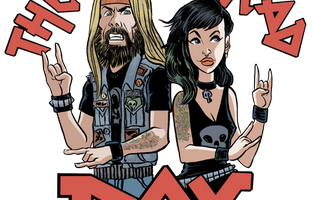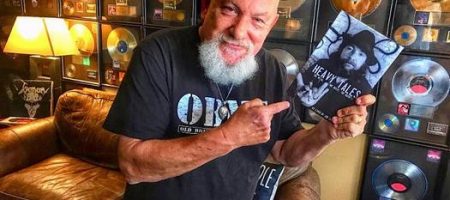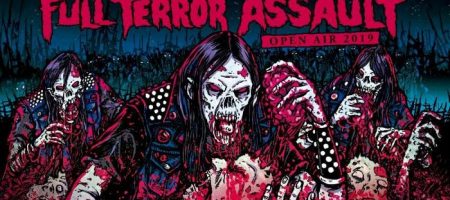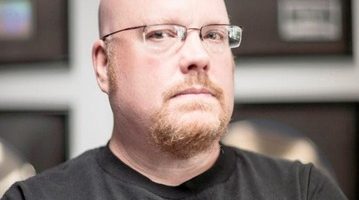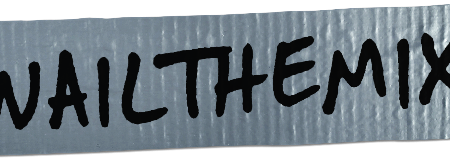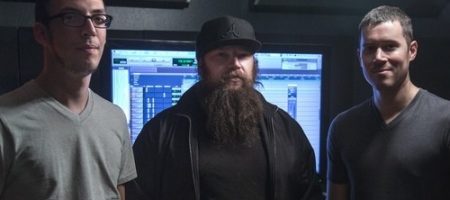Michael Alago – Breathing Music
Sunday, 22nd March 2020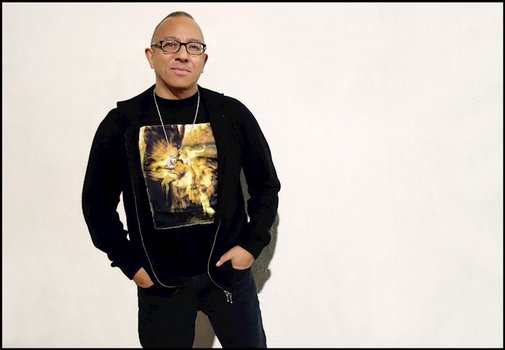
Everyone tends to look directly at the bands, but how are those bands that everyone loves so much found? Michael Alago spent 25 years in A&R, discovering bands and making notable signings like Metallica and many others during his tenure up to 2005. But he hasn’t moved on from having music as a major point of his life. But perhaps more important than that, he has a story to tell. He tested positive for HIV, he has recovered from alcoholism, and more!
We at DR aren’t the only one who has this image, as he was the star of the documentary, Who the Fuck is That Guy? The Fabulous Journey of Michael Alago in 2017, and now is on the cusp of releasing his autobiography, I Am Michael Alago: Breathing Music – Signing Metallica – Beating Death. We were fortunate to talk with him at the end of February about the upcoming release and to have him discuss topics such as the music industry today, his mindset in overcoming alcoholism, and what it takes for bands to ‘make it.’ You can order the book HERE.
Dead Rhetoric: Could you speak to how the title Breathing Music relates to your life in general?
Michael Alago: The book is called I Am Michael Alago: Breathing Music – Signing Metallica – Beating Death. But you ask me to speak about ‘breathing music,’ that’s pretty easy for me. I do talk about, either in the introduction or the chapter called “Brooklyn,” I said that I feel like I came out of the womb loving music. I just loved music my entire life. I got all of my information about music from these shows on TV, like American Bandstand, Don Cornelius’ Soul Train, Don Kirshner’s Midnight Special – these were all music shows on TV that had lots of different types of artists on them. Everyone from Aretha Franklin, Alice Cooper, to Grand Funk Railroad and Todd Rundgren.
There was a wide variety of artists that were on these shows. That informed my listening at a very young age. At some point, I thought to myself, as a young kid in Brooklyn, that I wanted to be in the music business. But at fourteen/fifteen, what does that mean? I had no idea! So it was just an early teenager’s wish to do something in music, but not know what it was yet.
Dead Rhetoric: Do you feel that your life kind of embodies that ‘rock n roll’ spirit?
Alago: Absolutely! I think my whole life is about rock and roll! I think you could feel that when you watched the film, because I am dedicated to music. That’s what I did officially for 25 years. I worked for record companies and signed artists – that was what I lived for, and I still live for that. I don’t officially work for record companies – I stopped in 2005. But in 2009 and 2010, Cyndi Lauper called me up and asked if I wanted to help make two records. I did, and I was thrilled because she is extraordinary! About a year and a half ago, there’s this heavy band from south Florida called Ether Coven and I adore them. I got them a deal with Century Media Records and we just put out a record. Erik Rutan of Morbid Angel actually produced the record. I am always out there, looking for great music. Most of the time, it’s heavy, and that’s what my life is all about: music, art, theater, and rock and roll.
Dead Rhetoric: One thing I liked about the movie and the book was that you include everything. How important was presenting ‘the whole picture’ instead of just the glitz and glamour of it all?
Alago: I think if somebody is talking about a life that someone wants to make into a film or a book, it can’t just talk about one thing. I mean, you can, but that doesn’t give you an entire picture of who that person is. So when Drew Stone and Michael Alex made the documentary, I didn’t want it to be a metal film, although there are elements in there because of signing Metallica. I wanted the film to be about my life. That catapulted itself into this little company called Backbeat Books, who asked me if I had more stories. Do I have more stories? I have a million stories! So we made a book.
For me, I always want to tell the truth. I want to tell the truth about the music, my addiction and recovery, and health issues. Here we are in 2020, and I feel fantastic. I take good care of myself, I’ve been sober for almost 13 years, and when people hear things like that, I find that it’s helpful. I have never had fear about putting myself out there on the line, for anything at all. I don’t know where it came from, but there’s something within me that I’m just so open as a person that I can help and be of service where they need me: whether it’s music or for health issues or addiction and recovery – that’s what my life has been about this whole time. So in the movie and the book, I wanted to paint this broad picture of my life.
Dead Rhetoric: In painting this picture of yourself, what would you like people to take away in reading a book about you?
Alago: If you have a direction of what you want to do with your life, go for it. I think that also if one is in need of help, always ask for help. When you ask for help, you never know what’s going to happen. If you are suffering because of alcohol or any kind of addiction, you ask for help. There is always help there. So I guess what I want people to take away from the book is that anything can happen when you put your mind to something.
For me, I was a 14 year old kid in Brooklyn who wanted to be in music. I didn’t have a B-plan. I just kept saying that. At one point, at 19 years old, it manifested itself as me walking down a street in the east village and saw this beautiful building called The Ritz. People now know it as Webster Hall. I went in there and spoke to the promoter and he gave me a job. That was incredible, and it was the beginning of my life in the music business! What I did was answered Jerry Brandt’s phone, opened his mail, and got his lunch…and I thought, “Man, I’m in the music business!” You know what, I was a kid in the music business. That’s how it all started. So I think when you read the book, anything can happen in your life if you put your mind to it. I might not be exactly what you want, but a version of that sometimes happens. That version is perhaps all you need anyway.
Dead Rhetoric: You were young when you started out with A&R. What did that look like at the time?
Alago: I wound up getting my A&R job when I was 23 years old. That was at Elektra Records. When I got the job, I had no idea what A&R meant. I had to ask friends in the business and I found out that it meant, ‘artists and repertoire.’ If you ask me, it’s the most important part of a record company. If you don’t have great records, you don’t have anything to sell. That was my job – to go out every night, or as often as I wanted to, and hear music. It was my dream job that I really, finally got! So at my job, I would listen to cassettes and vinyl that needed major releases. Sometimes it was a crappy cassette, but it had a feeling to it that was really good. So that’s what I did every day.
I would get papers from all of my favorite cities, like New York, Boston, DC, Dallas, San Franscisco, LA, Toronto, Montreal – and we would clip out all of the music sections and see if there were any independent bands that needed releases. My assistant knew that specifically loved hard rock and metal. So if there was an artist, if it was a singer/songwriter that sounded like they had something to say on a universal level, we cut those articles out too. We just called people every day. That’s how I did my job.
Dead Rhetoric: As an A&R person for many years, what were some of the challenges that you had to deal with?
Alago: In a general sense, a lot of people ask me about the challenges of being gay in heavy metal, and the truth is that I never really thought about it that much. When I was going out, all we ever talked about was music. Whether someone is gay or straight, have one arm, they are black or Asian – whatever. I think that if people like you, they like you. I never got hung up on ‘they don’t like me because I’m gay.’ I may not like someone either.
At a very young age, I was open about who I am. When you are open about who you are, people are open about their lives as well. Whether it’s sexuality or not. Of course, not everyone is going to be loving and kind. But I was out every night and was a force to be reckoned with. I was drunk a lot and I took no b.s. from people. So I guess there were challenges, but I didn’t really recognize them because I was my own person out there doing a job. My whole life I have been a hard worker, and that’s how we got to where we are today, and you and I are talking.
Dead Rhetoric: When you did your documentary, how did it feel being able to get all of these people that you worked with over the years to be involved with it?
Alago: I have had this blessed life. I have always had good relationships with artists. Most of the time, we were the same age. They knew that I cared about them and they knew that I knew what I was talking about. It was only natural that when I asked the guys in Metallica to be in my documentary that they would say yes. I helped catapult them into the mainstream when I signed them in summer of ’84. Cyndi [Lauper] and I always had a great relationship. I adore Doyle from The Misfits. We love each other. The Misfits are one of my all-time favorite bands, bar none. So when I asked him to be in my documentary, he said, “Of course, angel.” We call each other angel, as silly as it sounds, that’s the truth. The same thing with John Lydon. I have known Jon for 39 years! From the day I met him in 1981, I did this debacle show with PIL at The Ritz, and we laughed about it. We have been friends for 39 years – I signed him to Elektra, I had to drop him from Elektra, and we have stayed friends this whole time with never an argument or bad word about each other.
That’s what all my relationships are about. They were all creative, and I was always very helpful to these people. Even when I wasn’t working with them anymore, we never left the relationship in any bad way. So when I asked if they would be in movie, they all said yes, including Phil Anselmo from Pantera and Scour. I love Phil with all my heart, and you know what, I never officially worked with him. He wanted to be in on the documentary, and I wanted him in the documentary. So I don’t know how to explain it but it’s a blessing. It was heartwarming when everyone said they would be in the film. I was amazed!
Dead Rhetoric: You went into photography and writing later in life. There’s a lot of people who are involved in both music and photography – where does the connection lie for you?
Alago: I have always liked pictures. Even as a little kid, when I went to other people’s houses, I would ask to see their family photo books. I just love the stories that pictures tell. So as a teenager, I always carried a Polaroid camera with me. As I grew up, I kept taking pictures – when I officially left record companies in 2005, I just thought I would be a photographer. I just started shooting photographs of men who were scarred and tattooed, because that’s what I liked shooting. So that was what I did for a while.
At some point, Mina Caputo from Life of Agony wrote a little poetry book called Night Blooming Jasmine Will Never Smell the Same. It’s a cute little book, and we made it like 8 years ago already. But I am always up for an adventure with my friends, and she is one of my besties. I’ve always been drawn to the arts – music, photography, and some forms of creative writing.
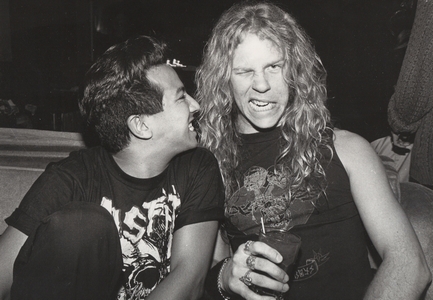
Dead Rhetoric: What do you think separates these big bands like Metallica that stay relevant to bands that come in and have their ‘fifteen minutes of fame’ and disappear?
Alago: I always hoped that I would never work of those types of bands that had ’15 minutes’ [laughs]. I was always very selective about who I signed. Doing A&R for 25 years, I listened to cassette after cassette after cassette. There’s a lot of good stuff in there. But good ain’t great, and you can’t sign good. You will drive yourself crazy. The finances will wash up quick. You always have to look for greatness. I think I was very lucky because I knew how to identify greatness.
Of course, we have to use Metallica. I saw these guys and they were relentless on stage. The energy was like nothing that I had saw or heard in my life. I knew they were onto something, and they knew they were on to something. After Kill ‘Em All came out, and Megaforce had just made Ride the Lightning, that was when I came into the picture and thought that I had to have these people in my life. In summer of 1984, they were playing with Anthrax and Raven. They were part of a triple act bill. I went to the gig, drunk, and had the best time of my life. They ripped the damn roof off the place, and I thought, “I am signing these people to Elektra.” That night I went backstage, we laughed, and they all couldn’t believe that I was the representative from Elektra. I looked like them. They were 21-22 and I was 24. I was in jeans and a Metallica t-shirt.
The next day, they were in my office and I bought them Chinese food and beer. I gave them all of the cool cassettes and vinyl – whether that was the Stooges, the Doors. Cliff Burton wanted all of the esoteric stuff that our other label, Nonesuch, was putting out. He was fabulous, and he was, I thought, the most seasoned musician in the band. When I saw them, I knew they were onto something. No one ever sounded like that. We were all listening to heavy metal, and it was traditional.
There was nothing traditional about Metallica. They mixed tradition, punk, speed, and a whole bunch of stuff that everyone likes to call thrash, but they were better than just that word. They were somewhat accomplished already. I knew that these people would be around for a long time. I so I signed them, and here we are in 2020 and they are still playing stadiums. They are playing stadiums because they have always stuck to their guns, they were true to themselves, and the music is extraordinary.
Dead Rhetoric: What challenges to you see that music faces in these changing times?
Alago: If we are talking about artists selling records these days – everyone is receiving their music in a very different way than when you went to a record store, you pulled out the vinyl/cd/cassette and you brought it home to listen to it. Vinyl is making a comeback now but it’s not huge like it used to be. People are getting their music on places like Spotify, Pandora, Bandcamp – it’s not the same, because they aren’t making the money they could be making. It’s very tricky making money these days. That’s why artists have to go on the road with a table full of merch: t-shirts, cds, cassettes. Ether Coven just put out a cassette. Do you think that people buy a lot of cassettes these days? No, but they love the aesthetic. They want people to get a cassette. I bought a cassette, even though I helped make the record. I just love all forms of music and how artists put their packages together. But I’m going on a tangent.
As I was saying, it’s difficult since people are getting their music in a different way. But music is always out there to look for. Because people like you exist, shouting to the rooftops about your favorite bands on your .com – people are finding music that way. People say to me that they wish they were at CBGBs back in the day to see Dead Boys. I say that I’m sorry that they are so young, but sometimes technology is our friend. You can go to YouTube, pull up Dead Boys 1977 CBGB and you are going to get a wicked crazy Dead Boys show. It’s not the same as being there, but thank god for technology.
Dead Rhetoric: You’ve survived and overcome numerous obstacles in your life, such as alcoholism. How important was your mindset in getting through these things?
Alago: You have to be sick and tired of yourself. Sometimes alcohol works, until it doesn’t work anymore. When it doesn’t work, your life goes to crap. When it doesn’t work, you don’t show up when you are supposed to. You lie, you cheat, and sometimes you steal. I had fun drinking for a very long time, until it wasn’t fun anymore. Until I became HIV-positive. Until I drank so much that my liver was killing me. My brain was killing me. I thought, I’m better than all of this. One day, at 47, I said to myself that I needed to stop drinking. I couldn’t do it anymore. I wanted to be clear. So I went to a 12-step meeting in my neighborhood, I sat down and I listened to what people were saying. We were all in the same boat. We got to that boat because we were all tired of ourselves. We wanted a new life.
In that new life, I don’t drink anymore. I show up. When my mother was dying, I showed up for her until the very last minute when she closed her eyes. So when you go from being an alcoholic to being sober, you show up for life. You are responsible. People can count on you, and that’s a beautiful thing. To think, if I wasn’t clean and sober – if I was a mess and smoking crack in the back of a taxi cab, do you think Drew Stone and Michael Alex would make a documentary about me? No! Do you think someone wants to make a documentary about a fall-down drunk? No. I pulled my life together, and they said that there was a story to tell here, so we told it. Same thing with the book. Life is incredible – and I am thankful for that every morning when I wake up.
Dead Rhetoric: You make a good point – it makes for a better story, to see that turn around rather than falling further apart. People like to see that you can pull yourself out of whatever you are on.
Alago: And some people can’t. We always talk about sex, drugs, and rock ‘n’ roll. It would have been a cliché if I had died. But I didn’t die, and like you said, I turned my life around. People like a good story when someone doesn’t drop dead. This has nothing to do with ego – but when people see that you can turn your life around, they think that they can do it too. Isn’t it great to inspire other people? I think so.
Dead Rhetoric: The book comes out in March. What’s going on for you in the coming months?
Alago: The book comes out March 31. I have a lot of press to do. I am doing some book readings as well. I will be doing some podcasts, and on the go in promoting my book for the next six months or so. The documentary has just been renewed by Netflix for another year, and we have been added to Amazon Prime as well. You can probably see it on YouTube as well. It’s extraordinary, I am still grateful and excited about it all.
Order I Am Michael Alago at Amazon
Michael Alago on Facebook











